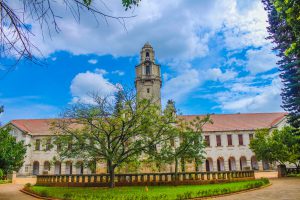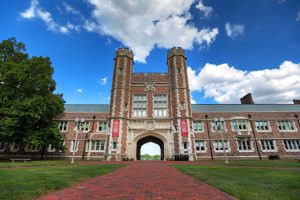

Photo credits: Nikhil More, James Byard
The current COVID-19 crisis has not dampened the collaborative spirit of the global scientific community. On August 25, 2020, delegates from the Indian Institute of Science (IISc) and Washington University in St Louis, USA, met virtually via Zoom and signed an agreement announcing a new partnership that outlines new research and academic opportunities.
“We are very excited about our collaboration with Washington University,” said Prof Govindan Rangarajan, Director of IISc. “In fact, we have already charted our plans for joint initiatives and identified specific areas for collaboration, including joint supervision or degree programs. We look forward to the success of this new partnership.”
“We are pleased to formally inaugurate the partnership between the Indian Institute of Science and Washington University,” said Washington University Chancellor Prof Andrew D Martin during the virtual event. “We have long been aware of IISc’s stellar research reputation, and we are delighted to be working together. Deepening the relationship, and bringing more students into the mix, is exactly the right type of model for cross-institution collaboration.”
The agreement spans research workshops and visits, plus joint course development and mentoring of PhD students in India and the US. This partnership has only formalised the already existing ties between IISc alumni and faculty members at McKelvey School of Engineering at Washington University. The domains in which the two universities will be collaborating include neuromorphic engineering, environmental science, aerosols research, and machine learning.
The groundwork for the agreement was laid by IISc faculty members Chetan Singh Thakur and Yadati Narahari from the Division of Electrical, Electronics and Computer Sciences, who collaborated with Shantanu Chakrabartty, the Clifford W Murphy Professor in the Preston M Green Department of Systems & Electrical Engineering at Washington University, who visited IISc several times.
Early this year, a course was co-developed by Thakur and Chakrabartty in the area of machine learning for edge computing. They are also jointly mentoring PhD students from both institutes. “The collaboration will also focus on the translation of research to real-world applications by leveraging the ecosystem [in] Bangalore, the Silicon Valley of India,” said Thakur, who is an Assistant Professor at IISc.
There are also plans to engage other regional universities and corporate partners by organising flagship workshops in neuromorphic engineering.
“By broadening the scope of this MoU to other areas, we will be able to strengthen the relationship with IISc,” said Chakrabartty. “Together, we also hope to engage local industries — both in the U.S. and India — to get the university/industry partnerships going as well.”



